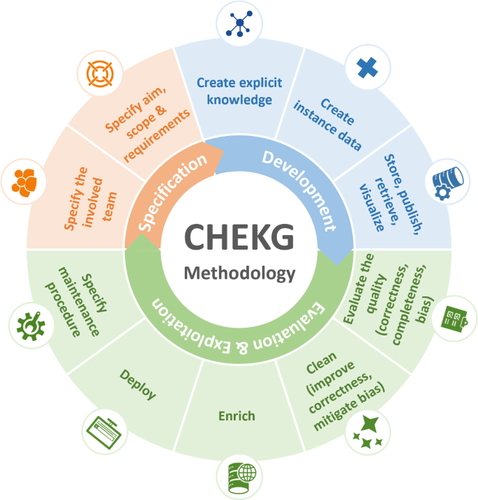Knowledge and Information Systems ( IF 2.7 ) Pub Date : 2024-04-20 , DOI: 10.1007/s10115-024-02110-w Sotiris Angelis , Efthymia Moraitou , George Caridakis , Konstantinos Kotis

|
Ontologies constitute the semantic model of Knowledge Graphs (KGs). This structural association indicates the potential existence of methodological analogies in the development of ontologies and KGs. The deployment of fully and well-defined methodologies for KG development based on existing ontology engineering methodologies (OEMs) has been suggested and efficiently applied. However, most of the modern/recent OEMs may not include tasks that (i) empower knowledge workers and domain experts to closely collaborate with ontology engineers and KG specialists for the development and maintenance of KGs, (ii) satisfy special requirements of KG development, such as (a) ensuring modularity and agility of KGs, (b) assessing and mitigating bias at schema and data levels. Toward this aim, the paper presents a methodology for the Collaborative and Hybrid Engineering of Knowledge Graphs (CHEKG), which constitutes a hybrid (schema-centric/top-down and data-driven/bottom-up), collaborative, agile, and iterative approach for developing modular and fair domain-specific KGs. CHEKG contributes to all phases of the KG engineering lifecycle: from the specification of a KG to its exploitation, evaluation, and refinement. The CHEKG methodology is based on the main phases of the extended Human-Centered Collaborative Ontology Engineering Methodology (ext-HCOME), while it adjusts and expands the individual processes and tasks of each phase according to the specialized requirements of KG development. Apart from the presentation of the methodology per se, the paper presents recent work regarding the deployment and evaluation of the CHEKG methodology for the engineering of semantic trajectories as KGs generated from unmanned aerial vehicles (UAVs) data during real cultural heritage documentation scenarios.
中文翻译:

CHEKG:一种用于工程模块化和公平的特定领域知识图的协作和混合方法
本体构成了知识图谱(KG)的语义模型。这种结构关联表明在本体和知识图谱的发展中方法论类比的潜在存在。已经建议并有效地应用了基于现有本体工程方法(OEM)的部署完全且明确定义的知识图谱开发方法。然而,大多数现代/最近的 OEM 可能不包含以下任务:(i) 使知识工作者和领域专家能够与本体工程师和知识图谱专家密切合作来开发和维护知识图谱,(ii) 满足知识图谱开发的特殊要求,例如(a)确保知识图谱的模块化和敏捷性,(b)评估和减轻模式和数据级别的偏差。为了实现这一目标,本文提出了一种知识图谱协同混合工程(CHEKG)的方法,该方法构成了混合(以模式为中心/自上而下和数据驱动/自下而上)、协作、敏捷和迭代的方法。开发模块化且公平的特定领域知识图谱的方法。 CHEKG 为 KG 工程生命周期的所有阶段做出了贡献:从 KG 的规范到其开发、评估和完善。 CHEKG方法论基于扩展的以人为中心的协作本体工程方法论(ext-HCOME)的主要阶段,同时根据知识图谱发展的特殊要求调整和扩展了每个阶段的单独流程和任务。除了介绍方法本身之外,本文还介绍了有关 CHEKG 方法的部署和评估的最新工作,该方法用于语义轨迹工程,作为在真实文化遗产记录场景中从无人机 (UAV) 数据生成的知识图谱。



























 京公网安备 11010802027423号
京公网安备 11010802027423号